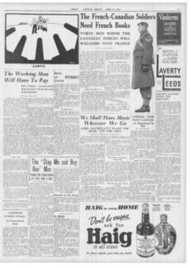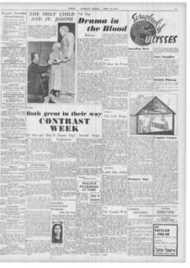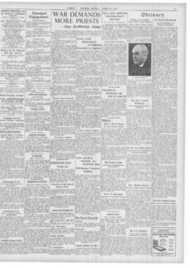Page 10, 19th April 1940
Page 10

Report an error
Noticed an error on this page?If you've noticed an error in this article please click here to report it.
Tags
Share
Related articles
British Union Of Fascists ; And Catholics The Two...
The Plain Truth
The City On Schacht Dismissal Political "nerves" Hit Markets
The Marseillaise
News Review
SAFE CUSTODY FOR RECORDS OF CHURCH IN GERMANY
From Our Own Correspondent
G SGOW
There is the strong possibility, I am informed, of an agreement between the British and German Governments on at least one subject—the removal to a place of safety of certain essential records of the Catholic Church in Germany.
In order that these documents; the exact nature of which is not yet divulged, might be transported from the scene of war to the safety of a neutral country, negotiations were carried on with the German Government. These resulted successfully in the German authorities giving the necessary permission.
The next step was to secure the co-operation of Britain's Minister for Economic Warfare to ensure that the sea journey of the records might be made safe.
DOSSIER OF AFFAIR FROM ROME Mr John McGovern, Member of Parliament for the Shettleston Division of Glasgow, last week received a letter from a highly-placed priest in Rome. With the communication was enclosed the dossier on the negotiations and a plea that Mr McGovern, his friend, would assist in the task of securing the removal of the records to a safe place.
Mr McGovern at once put the matter before the Minister, stressing the incalculable value, to Catholics, of their ecclesiastical records. He received the assurance that the Minister would give the matter his most earnest consideration.
"It was, strikingly enough, a Scots song that brought Father D and me together," said Mr McGovern, when he recalled his meeting with the priest, who now pleads for his aid. " My son and I had last summer reached the conclusion of a cycling tour in Italy, and were leaving the Central Station, Rome, on our homeward journey. Among the crowd of friends who came to see us off were many who had lived in Glasgow. " Ae the train prepared to depart they sang ' Will ye no' come back again ' and • Auld Lang Syne '—a strange scene in an Italian railway station.
" It was understandable that this should arouse considerable interest, and shortly after the train left I was approached by a priest. We became fast friends, exchanged views on a multitude of subjects.
"Father D was a man of boundless humour. Ile teas without the smallest element of racial bigotry, a keen, student of international affairs. On my return I quoted him freely—without mentimiing his name—in the House of Commons.
"We shook hands, promised to do anything for each other. We neither of us knew that war was but a few weeks away.
" And now my friend has written to me. The records of which he speaks must be preserved for posterity. Although I have no desire to anticipate the Minister for Economic Warfare I feel certain that the British Government will not interfere with the transit of these records from the scene of war to the archives of ecclesiastical history."
blog comments powered by Disqus











